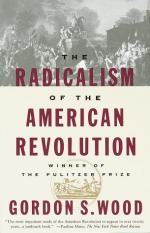
|
| Name: _________________________ | Period: ___________________ |
This test consists of 5 multiple choice questions, 5 short answer questions, and 10 short essay questions.
Multiple Choice Questions
1. What did Ben Franklin say about government?
(a) It should be obeyed.
(b) It's a man-made contrivance.
(c) It's a necessary evil.
(d) It should be abolished.
2. What is one way republicans are different from monarchists?
(a) Less subject to revolution.
(b) More subject to corruption.
(c) More subject to revolution.
(d) Less subject to corruption.
3. In the American colonies, what was the euphemistic name for every kind of personal connection, even if inherently unequal?
(a) Dependency.
(b) Patronage.
(c) Paternalism.
(d) Friendship.
4. Who was the most popular and powerful man in Massachusetts during the last quarter of the 18th century?
(a) John Hancock.
(b) Thomas Hutchinson.
(c) Henry McCulloch.
(d) Ben Franklin.
5. Who must yield power for a government to be good?
(a) Men interested in politics.
(b) Wealthy men.
(c) Men who care about society.
(d) Disinterested men.
Short Answer Questions
1. How was intermarriage and inbreeding looked upon by colonial gentry?
2. Who was the head of a colonial household?
3. What percentage of northern colonists were aristocrats?
4. In the 18th century, what did the golden age of Roman literature speak about?
5. Who in colonial America had the best opportunity to become wealthy?
Short Essay Questions
1. How did colonial imports of British goods change the twenty-five years before the Revolution?
2. How was republicanism defined at the time of the American Revolution?
3. What was the golden age of Roman literature?
4. Why was traditional hierarchical authority brought to question throughout the 18th century?
5. How was the term 'gentleman' redefined in the 16th century?
6. Before the revolution, what did the aristocracy think of the common people?
7. In small face-to-face colonial society, give two examples of how official and personal affairs combined.
8. What would a colonist do if someone spoke publicly against him?
9. How was mid-18th century colonial America a traditional society?
10. How did gentry families try to emulate English nobility?
|
This section contains 760 words (approx. 3 pages at 300 words per page) |

|




